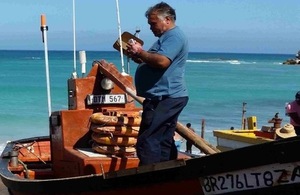UK Space Agency funds satellite solutions for developing countries
UK space businesses have won £70 million of funding for projects that will deliver practical help to developing countries.

The UK Space Agency’s International Partnership Programme (IPP), is a five-year, £152 million programme designed to partner UK space expertise with governments and organisations in emerging and developing economies around the world to deliver a sustainable, economic or societal benefit. Satellite data will be used to tackle problems such as flooding, drought, and deforestation.
The 21 chosen projects help provide solutions for local issues in countries across Africa, Asia and Central and South America. They include providing communications in remote areas for education and health provision, improving maritime safety for small fishing vessels in South Africa and Madagascar and reducing illegal logging in Guatemala.
The IPP focuses on using the UK Space sector’s research and innovation strengths to deliver practical and measurable effects to end-users in developing countries.
Funded from the Department for Business, Energy and Industrial Strategy’s Global Challenges Research Fund (GCRF), the IPP forms part of the UK’s Official Development Assistance (ODA) ring-fenced budget and is therefore fully ODA compliant. The projects underwent a rigorous selection process to ensure that they met strict requirements for ODA and UN sustainability goals. The UK Space Agency part funds IPP projects with a proportion of the cost shared by the programme applicants to ensure cost effectiveness and value for money.
The IPP will make a second call for applications later this year, with an opportunity for new projects to secure funding. For up to date information about IPP calls please email the IPP team on IPP@ukspaceagency.bis.gsi.gov.uk and ask to be added to the IPP Basecamp site.